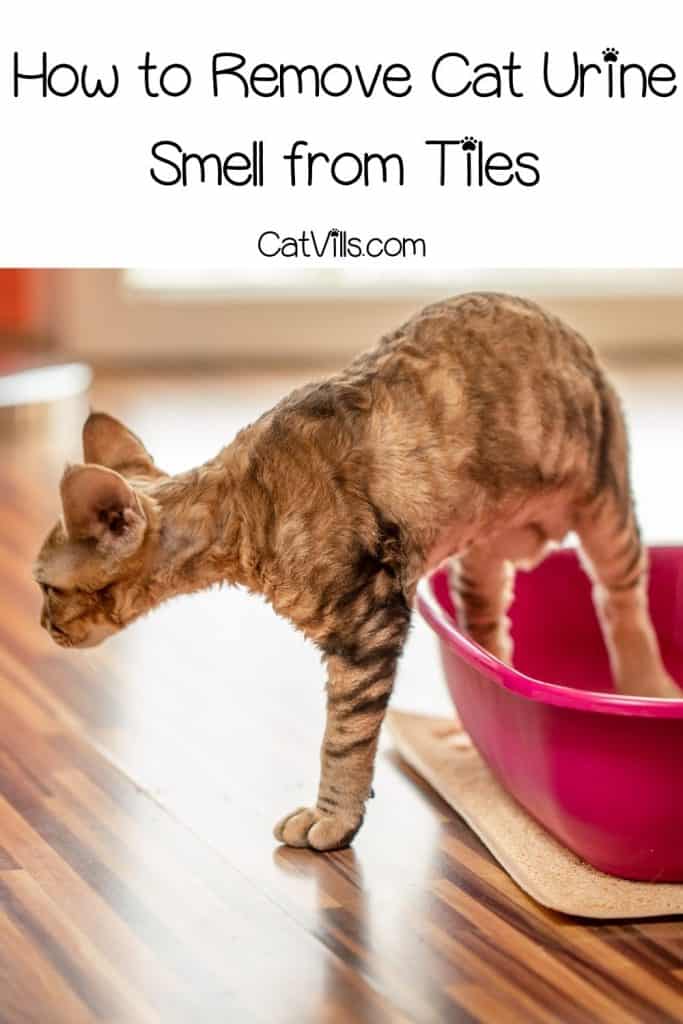Last Updated: 2 years ago
The process of how to remove cat urine smell from tile and grout isn’t fun.
Everyone will hate doing it simply because cat urine is disgusting.
But I intend to make it as painless as possible with a step-by-step guide.
You’ll soon have your tile and grout back to normal.
5 Steps to Remove Cat Urine Smell from Tile and Grout
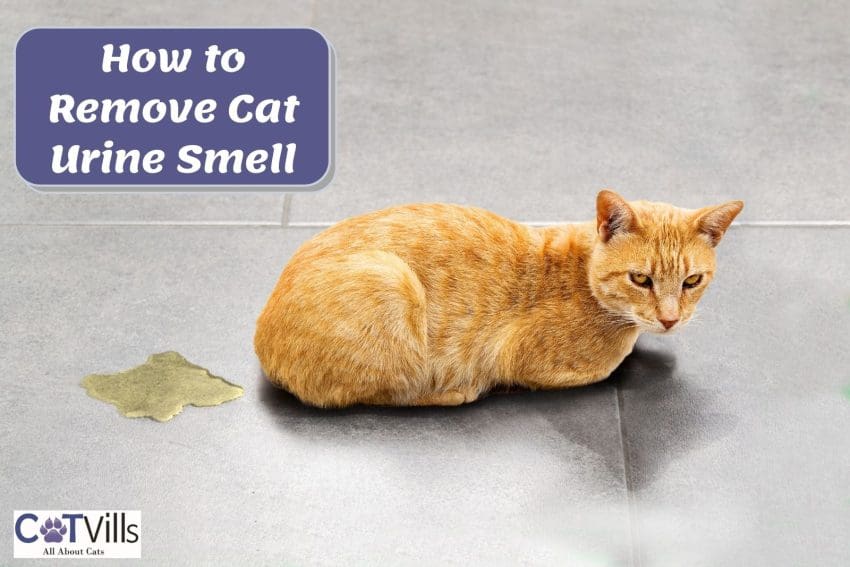
As any cat owner knows, cat urine odor is one of the worst smells in the entire world. But the worst part is it can stick around for weeks or months on certain surfaces.
Sadly, tile and grout are some of these surfaces. But there’s no need to worry as this 5-step guide will teach you how to clean it effectively:
Step 1: Grab Paper Towels
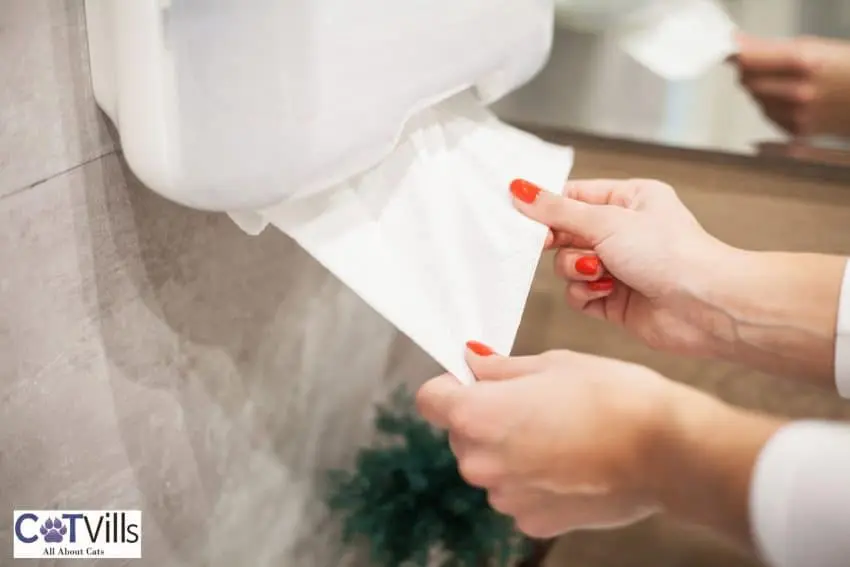
A logical starting point is grabbing high-quality paper towels.
You should then take several, fold them in half, use them to absorb any fresh urine, and throw them out.
Step 2: Use White Vinegar
Locate some undiluted white vinegar and pour it into a spray bottle. From there, mist the affected tiles and grout with vinegar.
But make sure to rub it in with a damp cloth. The vinegar will work as an all-natural deodorizer and cleaner to neutralize the cat urine while removing the odor.
Step 3: Wipe and Reapply the Vinegar
Your next step will be using a dry cloth to wipe away the vinegar. Afterward, mist the tiles and grout with vinegar again.
But let the reapplied vinegar air-dry on the tiles and floor.
Step 4: Create a Bleach and Water Solution
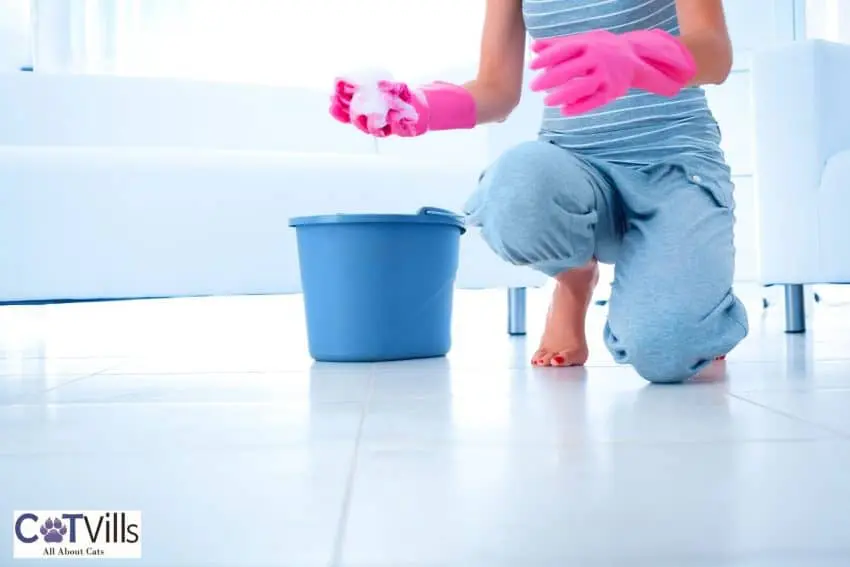
You’ll need to fill up a bucket with one gallon of cool water and a cup of oxygen bleach. Then, take an old toothbrush and dip it into your solution.
Use this toothbrush to scrub the grout furiously. The oxygen bleach solution will brighten up the grout and remove any left-behind urine stains.
Step 5: Use a Sponge and Cloth to Finish the Job
Soak a sponge in your bleach solution and wring out any excess liquid. You’ll then use it to wipe the tiles and grout.
Once you’ve wiped the areas, use a damp cloth to rinse the mixture from the titles. Use a clean towel to wipe the tiles and grout clean.
You can also check out this video for more tips:
Why does Cat Pee Stink?
Honestly, cat pee doesn’t necessarily smell worse than other urine types. But it lingers longer than those different types, making it seem much worse.
Understanding the cause of its smell will require knowing what makes up cat pee. These seven ingredients are the culprits for making cat urine such a smelly nightmare:
- Sodium
- Uric acid
- Urobilin/urobilinogin
- Creatinine
- Pheromones
- Urea
- Bacteria
But cat urine’s strong odor comes from the first step of its decomposition. Bacteria break down the urea and release the ammonia smell associated with cat pee.
Why Does Cat Urine Linger?
The ammonia scent produced by cat urine wouldn’t be as bad if it didn’t linger. But it does as this issue comes from pheromones released from the urine.
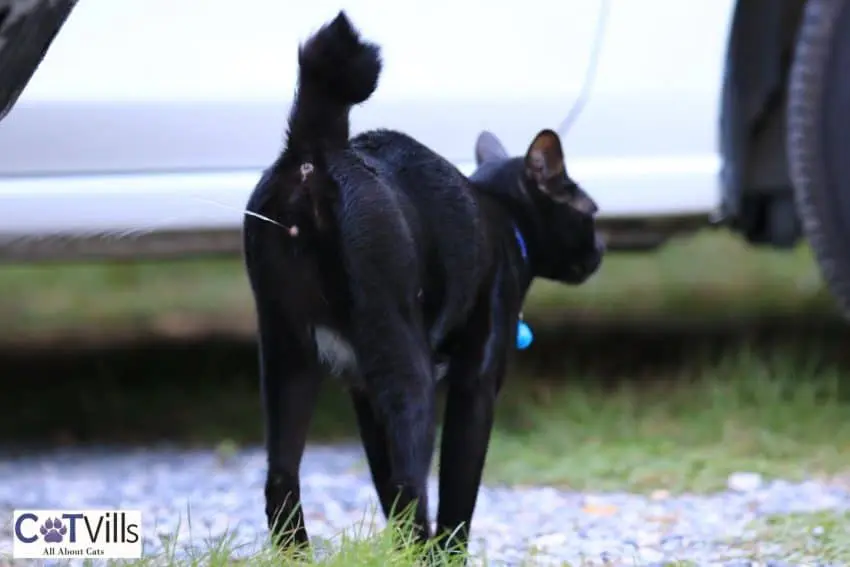
Male cats, especially non-neutered ones, have high levels of Felinine, “a putative pheromone precursor,” in their pee. Feline doesn’t have a strong odor initially, but it gets stinkier as it breaks down.
It’s a helpful attribute for cats living in the wild. After all, it makes sure their scent doesn’t dissipate quickly when marking their territory.
But it’s not great for cat owners, who have to smell it inside their homes. Sadly, this lingering problem is why many household cleaning products aren’t effective at removing cat urine.
A simple way to keep the stink at bay would be to neuter male cats. In doing so, the pheromones in your cat’s urine will reduce significantly, which happened with my cat.
I also need to mention that cat urine odor can indicate medical conditions. If your cat’s pee becomes extremely pungent or changes, take them to the vet immediately.
Your vet shouldn’t have any issues telling you what’s causing the smell or new odor. On a similar note, cats who start going outside the box should see a vet immediately.
Why Do Cats Ignore the Litter Box?
Many reasons could be why a cat chooses to ignore their litter box. For instance, a cat who’s not trained will likely urinate in random areas within your home.
Another possible reason is a dirty litter box. Cats are picky about where they do their business, so a contaminated bathroom area will make them uncomfortable.
But health and behavioral reasons are most commonly associated with litter box issues. So if your cat starts doing their business elsewhere out of nowhere, a vet visit becomes necessary.
Here’s another video to watch:
Anyone looking for more info about cat litter boxes should check out our Cat Litter Box Guide.
FAQ
How long does cat urine odor last
Cat urine odor can last in carpets, fabrics, and wood for years. Its longevity comes from it containing uric acid, which can recrystallize on humid days even after being “neutralized.”
Does grout hold urine smell?
Grout does hold a urine smell as it’s known for being surprisingly absorbent. As a result, it’s difficult to remove stains and smells like cat urine from it. It also doesn’t help that a cat can smell the residue beneath the surface, even without a noticeable stain.
Conclusion
Removing cat urine odor from tile and grout requires a little patience and effort. However, I’m fully confident our guide will ensure this pesky smell goes away forever.
But if you still have questions or concerns, please let me know in the comment section. I’ll make sure to answer each one as soon as possible. Thanks for reading!
Resources:
